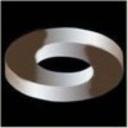Yahoo Answers is shutting down on May 4th, 2021 (Eastern Time) and beginning April 20th, 2021 (Eastern Time) the Yahoo Answers website will be in read-only mode. There will be no changes to other Yahoo properties or services, or your Yahoo account. You can find more information about the Yahoo Answers shutdown and how to download your data on this help page.
Trending News
Is the area swept by pendulums of different lengths, in a given time, constant.?
I should add. If the angle of the amplitude is the same and remains constant.
To Za, Doesn't a pendulum four times the length sweep an area 16 x as great?
3 Answers
- kirchweyLv 71 decade agoFavorite Answer
No. The area/time of even a single pendulum isn't constant since it depends on the amplitude of the swing.
EDIT: Given a constant angular amplitude, the arc distance increases as pendulum length L, and the swept area A increases as L^2. However, the period T = 2pi*sqrt(L/g), thus it only increases as sqrt(L). Thus area/time increases as L^2/sqrt(L) = L^1.5. So per your example, if L quadruples, A increases by 16 and T increases by 2, thus A/T increases by 8, which = 4^1.5.
Note that the small angular-amplitude dependent effect on period is constant, so it doesn't change this relationship.
- zaLv 71 decade ago
No. A pendulum 4 times as long will sweep out four times the area in one period. But it will take twice as long as the shorter pendulum, so the area swept out per second will be twice as great as that of the shorter pendulum.
Actually, although the time period doesn't depend much on the amplitude, it does depend very slightly. As the amplitude increases the period also increases, if only by a very small amount.
- HydracloneLv 51 decade ago
Since time and amplitude are completely independent of one another no matter how far you pull it back, the time period will remain fully and 100% constant if we were even physically capable of calculating it to exact.
As for the length, the longer the string, the greater the time period, as the greater the radius (length of string), the longer it takes to travel the same distances.
It's an effect known as Simple Harmonic Motion.
Source(s): I'm an A Level Physics Student, studying A2's.



